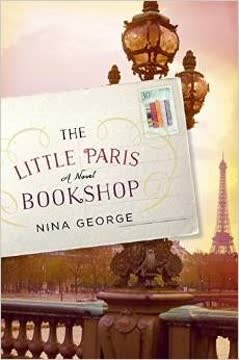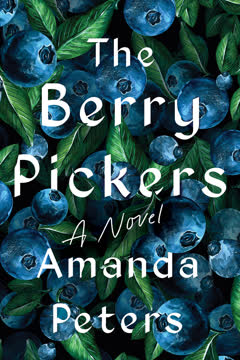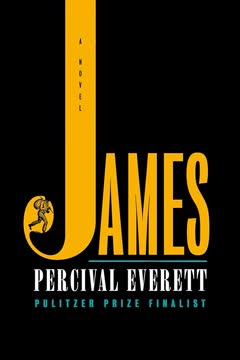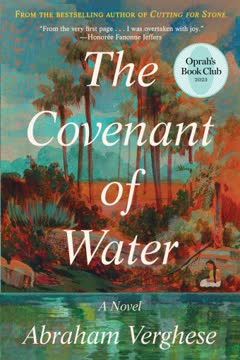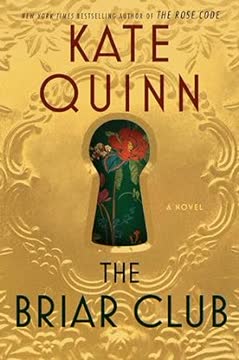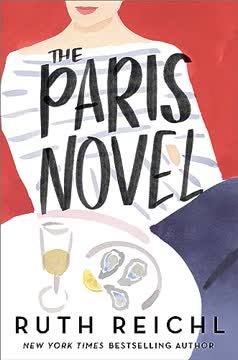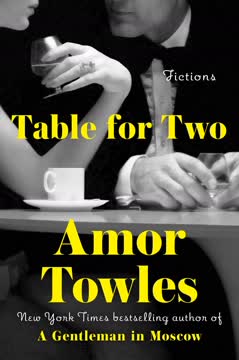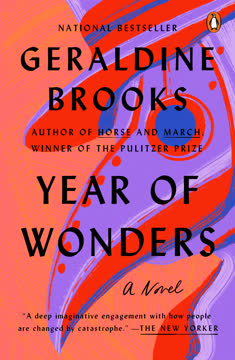Plot Summary
The Literary Apothecary's Secret
Jean Perdu, a Parisian bookseller, runs the Literary Apothecary, a floating bookshop on the Seine. He is not just a seller of books, but a "literary pharmacist," prescribing novels as remedies for the soul's ailments. Perdu's uncanny ability to sense what a customer needs is both a gift and a shield, allowing him to help others while hiding from his own pain. For over twenty years, he has lived in emotional exile, haunted by a lost love and a room in his apartment he cannot bear to enter. His life is orderly, solitary, and defined by the books he dispenses, but beneath the surface, he is paralyzed by grief and regret.
The Room of Lost Love
Behind a bookcase in Perdu's apartment lies the Lavender Room, untouched for two decades. It is a shrine to Manon, the woman he loved and lost. Entering the room to retrieve a table for a new neighbor, Perdu is overwhelmed by memories and the ache of absence. The room, once filled with laughter, love, and warmth, is now a mausoleum of faded wallpaper and vanished scents. The act of opening the door stirs a torrent of emotion, forcing Perdu to confront the emptiness at the heart of his existence and the memories he has tried so hard to suppress.
Prescriptions for the Heart
Perdu's daily life revolves around his barge and his customers, whom he treats with the same care as a doctor with patients. He refuses to sell books that might harm, instead offering stories that can heal, comfort, or provoke necessary tears. His neighbors and customers are a tapestry of Parisian life—lonely widows, overworked mothers, lost children, and the newly heartbroken. Through his interactions, Perdu reveals his philosophy: books are not just entertainment, but essential tools for living, loving, and surviving heartbreak.
The Letter Behind the Door
When Catherine, a new tenant abandoned by her husband, discovers an unopened letter in the drawer of the table Perdu gives her, she unwittingly unearths the secret at the core of his sorrow. The letter, written by Manon and left unread for twenty years, becomes a symbol of Perdu's inability to face the truth of his past. Catherine's insistence that he read it forces him to the brink of emotional collapse, as he is confronted with the possibility that everything he believed about Manon's departure was wrong.
Catherine's Arrival
Catherine, fragile and raw from her own heartbreak, forms a tentative bond with Perdu. Their shared loneliness and mutual understanding create a space for healing. Through simple acts—sharing a meal, exchanging books, and honest conversation—they begin to thaw each other's isolation. Catherine's presence challenges Perdu to reengage with life, even as the unopened letter looms between them, a barrier and a bridge.
The Unopened Goodbye
At last, Perdu reads Manon's letter. Its contents devastate him: Manon did not leave him out of indifference, but because she was dying and wanted to spare him the pain of her illness. She had asked him to come to her, to say goodbye, but his pride and fear kept him away. The revelation that he abandoned her in her final days fills Perdu with guilt and self-loathing. The letter becomes a catalyst, propelling him out of his stasis and into action.
The Journey South Begins
Unable to bear the weight of his regret, Perdu impulsively unmoors his book barge and sets off down the rivers of France, determined to find Manon's home in Provence and seek some form of redemption. He is joined by Max Jordan, a young, blocked author fleeing his own demons, and later by Salvatore Cuneo, a passionate Italian cook searching for a lost love. Together, they form an unlikely crew, each seeking healing and answers.
Companions on the Water
As the barge drifts south, the men share their stories, fears, and longings. Max confides his struggles with fame and paternal rejection; Cuneo reveals the truth about his own romantic quest. The journey becomes a floating confessional, where laughter, tears, and good food break down barriers. Perdu, for the first time, allows himself to grieve openly, to be comforted, and to comfort others. The river is both a literal and metaphorical path toward transformation.
Encounters and Confessions
Along the way, the travelers encounter a cast of memorable characters: a dying artist, a mysterious bookshop owner, and a community of eccentric bibliophiles. Each encounter offers a lesson in love, loss, and the courage to begin again. In the book town of Cuisery, Perdu finally discovers the true identity of Sanary, the author of his most cherished book, and learns that some stories are written for a single reader, just as some loves are meant to change a life.
The Book Town's Mystery
In Cuisery, the "town of books," Perdu meets Samy, the enigmatic woman behind the pseudonym Sanary. Her novel, Southern Lights, was written as a beacon for a soulmate she hoped would find her. Instead, it becomes the thread that connects Perdu to his own journey of healing. The revelation that stories can save lives, and that every reader brings a book to life in a unique way, deepens Perdu's understanding of literature's magic.
The Truth of Southern Lights
Samy's confession and the camaraderie of his companions help Perdu accept that grief and love are inseparable. He learns that the dead remain with us in memory and that the only way to honor them is to live fully. The journey south is not just about finding Manon's grave, but about reclaiming the capacity for joy, friendship, and new love.
The Vineyard of Memory
Arriving in Bonnieux, Perdu meets Luc, Manon's husband, and Victoria, her daughter. The confrontation is raw but ultimately healing. Luc and Perdu share their grief, anger, and love for Manon, realizing that she belonged to both of them in different ways. Manon's diary, entrusted to Perdu, offers her final words and blessings, allowing him to forgive himself and let go.
The Final Farewell
At Manon's grave, Perdu reads her diary and pours out his sorrow. He realizes that she is not confined to the tomb, but lives on in the land, the people she loved, and the memories they share. The act of saying goodbye is not an end, but a threshold to a new beginning. Perdu is finally able to release his grief and open himself to the future.
The Hurting Time
Perdu settles in the south, working in a bookshop and building a new life. He learns to live with the "hurting time," the liminal space between endings and beginnings. Through daily rituals—swimming, cooking, writing, and connecting with friends—he gradually finds peace. The pain of loss becomes a part of him, but no longer defines him.
The Return to Life
As the seasons turn, Perdu's world expands. He reconnects with his parents, deepens his friendship with Max, and finds contentment in simple pleasures. The south becomes a place of healing, where the past is honored but no longer a prison. Perdu's heart, once closed, is now open to love, laughter, and the possibility of happiness.
The Encyclopedia of Emotions
Inspired by his journey, Perdu begins to write The Great Encyclopedia of Small Emotions, a guide for literary pharmacists and lovers. He catalogs the subtle feelings that shape our lives—nostalgia, longing, hope, regret—and the books that can soothe or awaken them. The project is both a tribute to Manon and a gift to the world, a testament to the healing power of stories.
Love's New Beginning
Catherine returns to Perdu's life, and together they build a new relationship founded on honesty, vulnerability, and mutual care. Their love is quieter, more mature, and rooted in the lessons of loss. They savor the present, aware of its fragility and beauty. The past is not forgotten, but it no longer overshadows the future.
The Ritual of the Ashes
At Christmas, Perdu and his extended family gather in Provence to celebrate life, love, and memory. They perform the Ritual of the Ashes, an Occitan prayer for the dead, and share the thirteen desserts of tradition. The gathering is a symbol of continuity, resilience, and the enduring bonds between the living and the departed. Perdu, at last, is at peace, ready to face whatever comes next.
Characters
Jean Perdu
Jean Perdu is the heart of the novel—a sensitive, intelligent bookseller who prescribes literature as medicine for the soul. His defining trait is empathy, yet he is emotionally paralyzed by the loss of Manon, the woman he loved and never truly said goodbye to. Perdu's psychoanalysis reveals a man who has built walls to protect himself from pain, living in a self-imposed exile of routine and solitude. His journey is one of gradual awakening: from denial and avoidance, through grief and guilt, to acceptance and the courage to love again. Perdu's relationships—with Catherine, Max, Cuneo, and the memory of Manon—mirror his internal struggle to reconcile the past with the present and to find meaning in suffering.
Manon Morello
Manon is both a memory and a presence, her absence shaping the lives of those she left behind. She is passionate, impulsive, and deeply alive, embracing love, freedom, and the pleasures of the senses. Her affair with Perdu is marked by intensity and secrecy, as she is married to Luc and torn between two worlds. Manon's psychoanalysis reveals a woman who fears transience and seeks to experience everything before it is lost. Her final act—leaving Perdu without explanation—stems from a desire to spare him pain, but ultimately causes more. Through her diary and letter, Manon's voice guides Perdu toward forgiveness and renewal.
Catherine
Catherine enters the story as a woman shattered by betrayal, but she is resilient and open to transformation. Her relationship with Perdu is built on mutual vulnerability and the willingness to confront pain. Catherine's psychoanalysis reveals a history of self-effacement and longing for recognition, both as an artist and as a woman. Through her connection with Perdu, she learns to value herself and to offer love without fear. Catherine's development is a testament to the possibility of healing and the power of second chances.
Max Jordan
Max is a young, successful author crippled by writer's block and paternal rejection. He is impulsive, insecure, and desperate for approval, both as a writer and as a son. Max's journey with Perdu and Cuneo becomes a rite of passage, as he confronts his fears, learns to accept love, and discovers his own voice. His friendship with Perdu is paternal and fraternal, offering both men the chance to heal old wounds. Max's eventual embrace of children's literature and his relationship with Victoria signal his emergence into adulthood and self-acceptance.
Salvatore Cuneo
Cuneo is an Italian cook whose zest for life masks a deep loneliness. He is searching for a lost love, but his quest is as much about finding meaning as it is about reunion. Cuneo's psychoanalysis reveals a man who uses food, humor, and storytelling to connect with others and to stave off despair. His friendship with Perdu and Max is transformative, teaching him to let go of illusions and to embrace the present. Cuneo's eventual partnership with Samy is a reward for his openness and generosity.
Samy Le Trequesser (Sanary)
Samy is the mysterious writer behind Southern Lights, a book that becomes a lifeline for Perdu. She is wise, eccentric, and incapable of lying, living in the book town of Cuisery. Samy's psychoanalysis reveals a woman who writes to summon love and connection, believing in the magic of stories to change lives. Her meeting with Perdu is a moment of mutual recognition and closure, allowing both to move forward. Samy's relationship with Cuneo is a celebration of late-blooming love and the courage to begin anew.
Luc Basset
Luc is Manon's husband, a winemaker rooted in the land and traditions of Provence. He is strong, dependable, and capable of great love and forgiveness. Luc's psychoanalysis reveals a man who endures loss with dignity, refusing to be embittered by betrayal or tragedy. His acceptance of Perdu and his willingness to share Manon's memory are acts of grace, enabling both men to heal. Luc's relationship with his daughter Victoria is a continuation of his devotion to Manon.
Victoria
Victoria is Manon's daughter, a young woman who inherits her mother's strength and spirit. She is independent, capable, and unafraid to challenge expectations. Victoria's psychoanalysis reveals a person shaped by absence and longing, but determined to make her own way. Her relationship with Max is a symbol of hope and renewal, bridging the gap between past and future.
Madame Rosalette
Madame Rosalette is the glue of Perdu's Parisian apartment building, a source of gossip, comfort, and practical help. She represents the enduring bonds of community and the importance of small acts of kindness. Her psychoanalysis reveals a woman who finds meaning in the lives of others, serving as a surrogate family for the lonely and lost.
The Residents of 27 Rue Montagnard
The neighbors—widows, artists, children, and eccentrics—populate Perdu's world, each with their own struggles and joys. They are both background and catalyst, reflecting the themes of loneliness, connection, and the search for meaning. Their psychoanalysis reveals the diversity of human experience and the ways in which community can offer solace and support.
Plot Devices
The Floating Bookshop
Perdu's Literary Apothecary is both a literal and symbolic vessel, carrying him and his companions on a journey through France and through the stages of grief. The barge's movement mirrors Perdu's internal transformation, from stasis to flow, from isolation to connection. The bookshop is a sanctuary, a place of magic and possibility, but also a prison until Perdu learns to let go.
The Unopened Letter
Manon's letter, hidden and unread for twenty years, is the central plot device. It represents Perdu's refusal to face the truth and the consequences of avoidance. The act of reading the letter shatters his illusions and propels the narrative forward, forcing him to seek forgiveness and understanding.
The Journey South
The river journey is both physical and psychological, structured as a series of encounters, revelations, and tests. Each stop along the way offers a lesson or a challenge, moving Perdu closer to acceptance and renewal. The journey is also a homage to the tradition of the road novel, blending elements of adventure, romance, and self-discovery.
The Encyclopedia of Emotions
Perdu's project to catalog emotions and their literary remedies serves as a framework for the novel's exploration of grief, love, hope, and healing. The encyclopedia is both a personal therapy and a gift to others, embodying the novel's belief in the power of words to transform lives.
Foreshadowing and Symbolism
The Lavender Room, the unopened letter, the river, and the recurring references to food, music, and books all serve as symbols of Perdu's inner state and the possibility of change. The motif of doors—opened, closed, and finally unsealed—marks the stages of his journey. The Ritual of the Ashes and the thirteen desserts are rituals that anchor the narrative in tradition and community, offering closure and continuity.
Analysis
The Little Paris Bookshop is a luminous meditation on grief, healing, and the redemptive power of stories. Nina George crafts a narrative that is both whimsical and profound, using the metaphor of a literary apothecary to explore the ways in which books can serve as medicine for the soul. The novel's structure—a journey down the rivers of France—mirrors the stages of mourning, from denial and anger to acceptance and renewal. Through Perdu's transformation, the story affirms that loss is an inescapable part of life, but not its end; that love, once given, is never truly lost; and that the courage to open oneself to pain is also the courage to embrace joy. The book's lessons are timeless: healing requires honesty, vulnerability, and the willingness to let go of the past; community and friendship are essential to survival; and literature, in all its forms, is a lifeline for those adrift in sorrow. In a world that often prizes speed and distraction, The Little Paris Bookshop is a gentle reminder to slow down, to savor the present, and to trust in the possibility of new beginnings.
Last updated:
FAQ
0. Synopsis & Basic Details
What is The Little Paris Bookshop about?
- A Bookseller's Emotional Exile: Jean Perdu, a Parisian literary pharmacist, runs a floating bookshop on the Seine, prescribing books as remedies for his customers' emotional ailments. However, he remains emotionally paralyzed by the loss of Manon, the woman he loved, and has kept a room in his apartment sealed for twenty years, a monument to his unaddressed grief.
- An Unopened Letter's Catalyst: His carefully constructed solitude is shattered when a new neighbor, Catherine, discovers an unopened letter from Manon hidden in a piece of furniture Perdu gives her. This forces him to confront the past he has meticulously avoided.
- A Journey of Healing and Discovery: Driven by guilt and a desperate need for answers, Perdu unmoors his book barge and embarks on an impulsive journey south through the rivers of France. Accompanied by a young, blocked author, Max Jordan, and a passionate Italian cook, Salvatore Cuneo, Perdu seeks to understand Manon's departure and, in doing so, begins to rediscover himself and the possibility of new connections.
Why should I read The Little Paris Bookshop?
- Profound Emotional Resonance: Dive into a deeply moving story about grief, healing, and the courage to embrace life after loss. Readers seeking a narrative that explores the complexities of human emotion, self-forgiveness, and the transformative power of connection will find it profoundly resonant.
- A Celebration of Literature's Power: Experience a unique premise where books are not just stories, but potent medicine for the soul. The novel beautifully illustrates how literature can offer solace, provoke introspection, and guide individuals through their deepest struggles, making it a must-read for bibliophiles.
- Sensory-Rich Journey Through France: Immerse yourself in the vibrant landscapes, aromas, and flavors of France, from the bustling streets of Paris to the serene rivers and sun-drenched fields of Provence. Nina George's evocative prose creates a vivid, almost tactile experience, appealing to those who appreciate rich descriptive writing and a strong sense of place.
What is the background of The Little Paris Bookshop?
- Homage to French River Culture: The novel is deeply embedded in the cultural and geographical context of France's waterways, from the Seine to the Rhône. It highlights the unique lifestyle of river-dwellers, the network of locks and canals, and the distinct communities found along these routes, offering a glimpse into a less-seen aspect of French life.
- Literary Tradition and Philosophy: Nina George draws on a rich literary heritage, referencing real authors like Erich Kästner and E.M. Forster, and exploring the philosophical idea of books as therapeutic tools. This intertextual approach grounds the whimsical premise in a tradition of literature as a means of understanding and navigating the human condition.
- Sensory and Culinary Immersion: The story is steeped in the sensory details of French life, particularly its cuisine and natural landscapes. Descriptions of Provençal food, the scent of lavender, and the changing light are not mere background but integral to the characters' emotional journeys, reflecting a cultural appreciation for the pleasures of the senses as pathways to healing.
What are the most memorable quotes in The Little Paris Bookshop?
- "Memories are like wolves. You can't lock them away and hope they leave you alone.": This quote, appearing early in Chapter 1, powerfully foreshadows Jean Perdu's inevitable confrontation with his past. It encapsulates the novel's central theme of unresolved grief and the futility of emotional suppression, highlighting the psychological burden of unaddressed trauma.
- "We are loved if we love, another truth we always seem to forget.": Spoken by Samy in Chapter 32, this insight cuts to the core of human connection and vulnerability. It challenges the common desire to be loved above all else, emphasizing that the act of loving, with its inherent courage and lack of expectation, is what truly opens us to receiving love.
- "Death doesn't matter. It makes no difference to life. We will always remain what we were to one another.": This profound statement, found on Manon's gravestone and echoed in her diary (Chapter 44), offers the ultimate message of the novel. It provides solace and a framework for understanding enduring love and the presence of the departed, suggesting that true connection transcends physical absence and time.
What writing style, narrative choices, and literary techniques does Nina George use?
- Sensory-Rich and Evocative Prose: Nina George employs a highly descriptive and sensory writing style, immersing the reader in the sights, sounds, smells, and tastes of France. This technique, evident in descriptions like "air as warm as a brimming teacup" (Chapter 9) or the "sweet-and-sour tang on her skin" (Chapter 15), directly connects to the theme of Perdu's reawakening senses and his journey back to feeling alive.
- Dual Narrative and Epistolary Elements: The novel skillfully interweaves Jean Perdu's third-person perspective with Manon's first-person diary entries, creating a powerful dual narrative. Manon's diary, interspersed throughout the book, provides crucial backstory and emotional depth, building dramatic irony as the reader understands her motivations long before Perdu does, intensifying his eventual revelation.
- Personification and Metaphorical Language: George frequently personifies abstract concepts and uses rich metaphors to explore complex emotions. For instance, "Love, the dictator whom men find so terrifying" (Chapter 3) or "Habit is a vain and treacherous goddess" (Chapter 26) imbues these ideas with vivid, active roles, making the internal struggles of the characters more tangible and relatable for readers exploring
The Little Paris Bookshop themes.
1. Hidden Details & Subtle Connections
What are some minor details that add significant meaning?
- Perdu's Alphabetical Food Arrangement: Jean's meticulously alphabetized food shelf (Chapter 2) is a subtle but powerful detail revealing his deep-seated need for control and order in a life devoid of emotional spontaneity. This rigid system is a coping mechanism against the chaos of his unaddressed grief, highlighting his initial emotional paralysis before his journey.
- The Cats' Symbolic Names: The stray cats, Kafka and Lindgren (Chapter 4), are named after authors whose works reflect the novel's themes. Kafka, representing existential dread and alienation, mirrors Perdu's initial state, while Lindgren, symbolizing childhood wonder and resilience, hints at the emotional reawakening that awaits him. Their presence and interactions subtly underscore the narrative's emotional shifts.
- Madame Rosalette's Fabric Metaphors: The landlady's habit of describing people and places in terms of fabrics (e.g., Perdu is "cashmere compared with the normal yarn from which men are spun" in Chapter 1) reveals how individuals filter the world through their passions. This detail connects to Perdu's own "transperception," showing how personal interests shape perception and understanding, a key aspect of
Jean Perdu's analysis.
What are some subtle foreshadowing and callbacks?
- Manon's Early Diary Hints at Illness: In her first diary entry (Manon's Travel Diary, Chapter 14), Manon mentions her mother's "weeping with despair" and fear that "something might happen to me in Paris." This subtly foreshadows her eventual illness and death, hinting at a deeper, unspoken anxiety that predates her affair with Jean.
- Perdu's Dream of Breathing Underwater: Jean's dream of being able to "breathe underwater" (Chapter 20) is a powerful piece of foreshadowing for his emotional breakthrough. Max later interprets it as no longer being "choked by your emotions" (Chapter 20), directly predicting Perdu's ability to confront and process his grief without being overwhelmed, a key moment in
Jean Perdu's journey. - The "Hurting Time" Concept: Samy's explanation of the "halfway world" or "hurting time" between endings and new beginnings (Chapter 37) is a callback to Perdu's prolonged period of stasis. It provides a name and a framework for the emotional limbo he has inhabited for two decades, validating his experience and offering a path forward in his
The Little Paris Bookshop analysis.
What are some unexpected character connections?
- Perdu's Parents' Enduring Affection: Jean's parents, despite their early divorce and constant bickering, maintain a deep, if unconventional, connection, with Joaquin visiting Lirabelle and acting as her "best friend" (Chapter 40). This relationship subtly mirrors the complex, non-traditional forms of love explored in the novel and foreshadows Perdu's own capacity for enduring, evolving affection beyond conventional expectations.
- Max Jordan's Connection to Victoria's Mother: The revelation that Max falls in love with Victoria, Manon's daughter, creates an unexpected and poignant link between the past and present. It connects Max's journey of finding his "story" and paternal acceptance to Manon's legacy, subtly suggesting a continuation of her vibrant spirit through her daughter and Max's new family. This is a crucial
Max Jordan character developmentpoint. - Madame Rosalette's Unsung Role: Beyond her gossip, Madame Rosalette's meticulous tracking of her neighbors' lives (Chapter 7) and her eventual role in helping Catherine locate Perdu (Chapter 38) reveals her as an unsung "keeper of secrets" and a vital, if unwitting, facilitator of connection. Her "espionage" ultimately serves to bring people together, highlighting the importance of community in
The Little Paris Bookshop themes.
Who are the most significant supporting characters?
- Victoria, Manon's Daughter: Victoria is more than just Manon's child; she is a living embodiment of Manon's spirit and choices, and a bridge between Jean's past and Max's future. Her strength, independence, and connection to the land (driving the tractor, working the vineyard) represent the continuation of life and love, offering a tangible legacy that helps Perdu find closure and Max find purpose.
- Samy Le Trequesser (Sanary): As the author of "Southern Lights," Samy is a pivotal figure who provides Perdu with the intellectual and emotional framework for his healing. Her inability to lie and her wisdom about love, loss, and the "hurting time" (Chapter 37) directly guide Perdu's self-discovery, making her a literary mentor and a catalyst for his transformation. Her connection with Cuneo also highlights the possibility of new love.
- Perdu's Parents, Lirabelle and Joaquin: Despite their physical absence for much of the narrative, Jean's parents represent different facets of love and life. Lirabelle's intellectualism and Joaquin's earthy wisdom (Chapter 9) offer contrasting perspectives on relationships and personal growth, subtly influencing Jean's understanding of himself and his capacity for love. Their eventual reconciliation, however unconventional, provides a model for Jean's own journey.
2. Psychological, Emotional, & Relational Analysis
What are some unspoken motivations of the characters?
- Perdu's Fear of Vulnerability: Beyond grief, Jean Perdu's refusal to open Manon's letter for twenty years (Chapter 12) is deeply rooted in an unspoken fear of vulnerability and a desire to protect his pride. He anticipated a "Dear John" letter, and by not opening it, he maintained a sense of control over the narrative of his abandonment, avoiding the deeper pain of rejection and the messiness of true emotional engagement. This is a core
Jean Perdu motivation. - Manon's Self-Punishment: Manon's decision to conceal her terminal illness from Jean (Manon's Diary, Chapter 33) is motivated not only by a desire to spare him pain but also by a subtle, unspoken sense of self-punishment. She confesses to feeling "ashamed" and that it was her "just deserts for loving twice in one lifetime," suggesting a deep-seated guilt about her dual life that led her to endure her suffering in isolation.
- Max Jordan's Search for Paternal Approval: Max's relentless pursuit of a "story" and his initial writer's block (Chapter 5) are driven by an unspoken, profound need for his father's approval, who dismissed his success as a "perverted story" (Chapter 17). His journey
0. Synopsis & Basic Details
What is The Little Paris Bookshop about?
- A Bookseller's Emotional Exile: Jean Perdu, a Parisian literary pharmacist, runs a floating bookshop on the Seine, prescribing books as remedies for his customers' emotional ailments. However, he remains emotionally paralyzed by the loss of Manon, the woman he loved, and has kept a room in his apartment sealed for twenty years, a monument to his unaddressed grief.
- An Unopened Letter's Catalyst: His carefully constructed solitude is shattered when a new neighbor, Catherine, discovers an unopened letter from Manon hidden in a piece of furniture Perdu gives her. This forces him to confront the past he has meticulously avoided.
- A Journey of Healing and Discovery: Driven by guilt and a desperate need for answers, Perdu unmoors his book barge and embarks on an impulsive journey south through the rivers of France. Accompanied by a young, blocked author, Max Jordan, and a passionate Italian cook, Salvatore Cuneo, Perdu seeks to understand Manon's departure and, in doing so, begins to rediscover himself and the possibility of new connections.
Why should I read The Little Paris Bookshop?
- Profound Emotional Resonance: Dive into a deeply moving story about grief, healing, and the courage to embrace life after loss. Readers seeking a narrative that explores the complexities of human emotion, self-forgiveness, and the transformative power of connection will find it profoundly resonant.
- A Celebration of Literature's Power: Experience a unique premise where books are not just stories, but potent medicine for the soul. The novel beautifully illustrates how literature can offer solace, provoke introspection, and guide individuals through their deepest struggles, making it a must-read for bibliophiles.
- Sensory-Rich Journey Through France: Immerse yourself in the vibrant landscapes, aromas, and flavors of France, from the bustling streets of Paris to the serene rivers and sun-drenched fields of Provence. Nina George's evocative prose creates a vivid, almost tactile experience, appealing to those who appreciate rich descriptive writing and a strong sense of place.
What is the background of The Little Paris Bookshop?
- Homage to French River Culture: The novel is deeply embedded in the cultural and geographical context of France's waterways, from the Seine to the Rhône. It highlights the unique lifestyle of river-dwellers, the network of locks and canals, and the distinct communities found along these routes, offering a glimpse into a less-seen aspect of French life.
- Literary Tradition and Philosophy: Nina George draws on a rich literary heritage, referencing real authors like Erich Kästner and E.M. Forster, and exploring the philosophical idea of books as therapeutic tools. This intertextual approach grounds the whimsical premise in a tradition of literature as a means of understanding and navigating the human condition.
- Sensory and Culinary Immersion: The story is steeped in the sensory details of French life, particularly its cuisine and natural landscapes. Descriptions of Provençal food, the scent of lavender, and the changing light are not mere background but integral to the characters' emotional journeys, reflecting a cultural appreciation for the pleasures of the senses as pathways to healing.
What are the most memorable quotes in The Little Paris Bookshop?
- "Memories are like wolves. You can't lock them away and hope they leave you alone.": This quote, appearing early in Chapter 1, powerfully foreshadows Jean Perdu's inevitable confrontation with his past. It encapsulates the novel's central theme of unresolved grief and the futility of emotional suppression, highlighting the psychological burden of unaddressed trauma.
- "We are loved if we love, another truth we always seem to forget.": Spoken by Samy in Chapter 32, this insight cuts to the core of human connection and vulnerability. It challenges the common desire to be loved above all else, emphasizing that the act of loving, with its inherent courage and lack of expectation, is what truly opens us to receiving love.
- "Death doesn't matter. It makes no difference to life. We will always remain what we were to one another.": This profound statement, found on Manon's gravestone and echoed in her diary (Chapter 44), offers the ultimate message of the novel. It provides solace and a framework for understanding enduring love and the presence of the departed, suggesting that true connection transcends physical absence and time.
What writing style, narrative choices, and literary techniques does Nina George use?
- Sensory-Rich and Evocative Prose: Nina George employs a highly descriptive and sensory writing style, immersing the reader in the sights, sounds, smells, and tastes of France. This technique, evident in descriptions like "air as warm as a brimming teacup" (Chapter 9) or the "sweet-and-sour tang on her skin" (Chapter 15), directly connects to the theme of Perdu's reawakening senses and his journey back to feeling alive.
- Dual Narrative and Epistolary Elements: The novel skillfully interweaves Jean Perdu's third-person perspective with Manon's first-person diary entries, creating a powerful dual narrative. Manon's diary, interspersed throughout the book, provides crucial backstory and emotional depth, building dramatic irony as the reader understands her motivations long before Perdu does, intensifying his eventual revelation.
- Personification and Metaphorical Language: George frequently personifies abstract concepts and uses rich metaphors to explore complex emotions. For instance, "Love, the dictator whom men find so terrifying" (Chapter 3) or "Habit is a vain and treacherous goddess" (Chapter 26) imbues these ideas with vivid, active roles, making the internal struggles of the characters more tangible and relatable for readers exploring
The Little Paris Bookshop themes.
1. Hidden Details & Subtle Connections
What are some minor details that add significant meaning?
- Perdu's Alphabetical Food Arrangement: Jean's meticulously alphabetized food shelf (Chapter 2) is a subtle but powerful detail revealing his deep-seated need for control and order in a life devoid of emotional spontaneity. This rigid system is a coping mechanism against the chaos of his unaddressed grief, highlighting his initial emotional paralysis before his journey.
- The Cats' Symbolic Names: The stray cats, Kafka and Lindgren (Chapter 4), are named after authors whose works reflect the novel's themes. Kafka, representing existential dread and alienation, mirrors Perdu's initial state, while Lindgren, symbolizing childhood wonder and resilience, hints at the emotional reawakening that awaits him. Their presence and interactions subtly underscore the narrative's emotional shifts.
- Madame Rosalette's Fabric Metaphors: The landlady's habit of describing people and places in terms of fabrics (e.g., Perdu is "cashmere compared with the normal yarn from which men are spun" in Chapter 1) reveals how individuals filter the world through their passions. This detail connects to Perdu's own "transperception," showing how personal interests shape perception and understanding, a key aspect of
Jean Perdu's analysis.
What are some subtle foreshadowing and callbacks?
- Manon's Early Diary Hints at Illness: In her first diary entry (Manon's Travel Diary, Chapter 14), Manon mentions her mother's "weeping with despair" and fear that "something might happen to me in Paris." This subtly foreshadows her eventual illness and death, hinting at a deeper, unspoken anxiety that predates her affair with Jean.
- Perdu's Dream of Breathing Underwater: Jean's dream of being able to "breathe underwater" (Chapter 20) is a powerful piece of foreshadowing for his emotional breakthrough. Max later interprets it as no longer being "choked by your emotions" (Chapter 20), directly predicting Perdu's ability to confront and process his grief without being overwhelmed, a key moment in
Jean Perdu's journey. - The "Hurting Time" Concept: Samy's explanation of the "halfway world" or "hurting time" between endings and new beginnings (Chapter 37) is a callback to Perdu's prolonged period of stasis. It provides a name and a framework for the emotional limbo he has inhabited for two decades, validating his experience and offering a path forward in his
The Little Paris Bookshop analysis.
What are some unexpected character connections?
- Perdu's Parents' Enduring Affection: Jean's parents, despite their early divorce and constant bickering, maintain a deep, if unconventional, connection, with Joaquin visiting Lirabelle and acting as her "best friend" (Chapter 40). This relationship subtly mirrors the complex, non-traditional forms of love explored in the novel and foreshadows Perdu's own capacity for enduring, evolving affection beyond conventional expectations.
- Max Jordan's Connection to Victoria's Mother: The revelation that Max falls in love with Victoria, Manon's daughter, creates an unexpected and poignant link between the past and present. It connects Max's journey of finding his "story" and paternal acceptance to Manon's legacy, subtly suggesting a continuation of her vibrant spirit through her daughter and Max's new family. This is a crucial
Max Jordan character developmentpoint. - Madame Rosalette's Unsung Role: Beyond her gossip, Madame Rosalette's meticulous tracking of her neighbors' lives (Chapter 7) and her eventual role in helping Catherine locate [Perdu](#jean-per
Review Summary
The Little Paris Bookshop receives mixed reviews. Many readers love its romantic portrayal of a bookseller who prescribes novels as medicine, praising the beautiful prose and emotional depth. Critics find it overly sentimental and cliché-ridden. Some appreciate the French setting and literary references but struggle with the pacing and character development. The story follows Jean Perdu as he embarks on a journey of self-discovery and healing after years of heartbreak. While some readers find it deeply moving, others feel manipulated by the emotional narrative.
Jean Perdu Series
Similar Books
Download PDF
Download EPUB
.epub digital book format is ideal for reading ebooks on phones, tablets, and e-readers.
